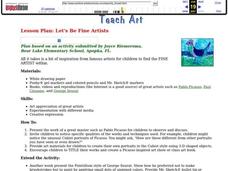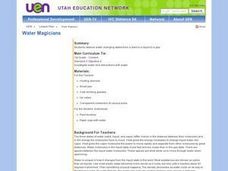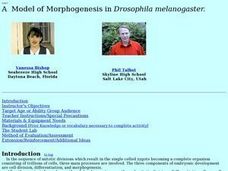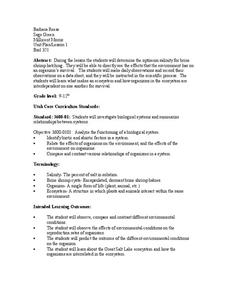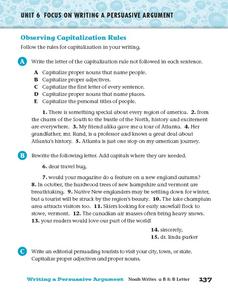Curated OER
Graphin' And Glyphin' Utah Weather
Fourth graders investigate the concepts of looking at sets of data. The focus of the study is upon the local weather of Utah. They study the weather found in the city and in the country and make comparisons based upon geographical location.
Curated OER
Sandpaper Drawings
Students examine images of sand art from different cultures. They create their own version of a sand art picture.
Curated OER
High Five Dance Warm Up
Learners stand in a circle in sequential order. They grapevine to the middle of the circle when they hear their number. When in the middle of the circle, students high five someone and then grapevine out of the circle. Numbers may be...
Curated OER
Capitalization
In these capitalization worksheets, students review the capitalization rules and then complete three pages of exercises that help them understand capitalization.
Curated OER
The States of Water
Students observe water changing states from a solid to a liquid to a gas.
Curated OER
Heritage: Famous People of the West
Fourth graders examine two famous people, Brigham Young and Jim Bridger, who made an impact on the westward expansion, and create cartoon strip using the information.
Curated OER
UMNH: The Fremont People
Third graders explore the Fremont people and then make their own Fremont-Style pottery.
Curated OER
Environmental Differences
Young scholars observe and conduct an experiment to see whether differences in salinity (the environment) have an affect on the hatching rate and survival of brine shrimp.
Curated OER
Glaciers
Seventh graders summarize how Earth processes today are similar to those that occurred in the past, and explain how slow geologic processes have large cumulative effects over long periods of time.
Curated OER
Dancing Good and Evil from Dance in America
Students create a pantomime, work cooperatively to conduct and share research, identify and discuss how movement is used to depict the ethereal Odette and the sinister Odile, and creatively pay tribute to the lovers, Odette and Siegfried.
Curated OER
Magazine Madness
Students look at pictures cut out of magazines to determine what is happening in the picture and predict what will happen next.
Curated OER
Water Density Boundaries
Students create observable layers in water that represent a separation based upon density differences. They model density boundaries using differences in temperature and salinity. They, in groups, perform a meaningful experiment...
Curated OER
Water Magicians
First graders observe water changing states from a solid to a liquid to a gas. They predict what they think happen to ice cubes as they sit out. They paint water with paintbrushes outside the classroom in the sun and watch the water...
Curated OER
Everyday vs. Extreme Relationships with Nature
Students examine the interactions with nature and the environment. They discover where water comes from and ways to conserve water. They also examine energy sources and consumption.
Curated OER
A Model of Morphogenesis in Drosophila Melanogaster
Learners investigate the following scientific terms and ideas: rates of diffusion, the role of morphogens in the development of larva, the chemical dynamics of a cell, and the significance of embryo polarity during development.
Curated OER
Excited about Expression!
Students discuss what expression is and listen to the teacher read a page without expression. They give suggestions of how the reading could be more expressive and exciting and observe as they are written on the board. They then discuss...
Curated OER
Hatching Brine Shrimp
Third graders investigate the environment that is considered favorable for brine shrimp hatching. The salinity level is of particular interest in the observations because the optimum level is needed for survival. They make daily...
Curated OER
What Is A Dinosaur?
Students use the question of "What is a dinosaur?" in order to establish the context for a class investigation. They use a variety of resources in order to gather information. Students compare and contrast the similarities or differences...
Curated OER
Strangers in Their Own Land
Pupils use interview techniques to explore the traditional wisdom of fishers, farmers, First Nations, and other peoples whose close relationship with nature gives them a deeper understanding of, and sensitivity toward, climatic cycles...
Curated OER
Social Studies: The Fremont People
Students examine the culture of the Fremont people prior to creating their own copies of their pottery. With teacher-supplied clay, students follow instruction sheets to make their own replicas based on the Fremont pottery designs.
Curated OER
Brain POP - Volcano
In this volcano worksheet, students complete 15 fill in the blank questions on the basics of volcano structure and volcano trivia.
Curated OER
Rocks Word Search Puzzle
In this literacy worksheet, middle schoolers look for the words that are related to the concept that is reviewed in the sheet. They also acquire new vocabulary.
Curated OER
Observing Capitalization Rules
In this capitalization worksheet, students complete three activities that help them follow the rules for capitalization in their writing.
Curated OER
Beginning Analogies 9
In this analogies learning exercise, students read the word pairs and choose the answer that best expresses a relationship similar to the original pair.
Other popular searches
- Great Lakes Worksheet
- Great Lakes Biodiversity
- Great Lakes Map
- Label the Great Lakes
- Maps of Great Lakes
- The Great Lakes
- Michigan's Great Lakes
- Five Great Lakes
- Great Lakes Region
- Great Lakes Lesson Plans
- Traveling the Great Lakes
- Activities the Great Lakes



